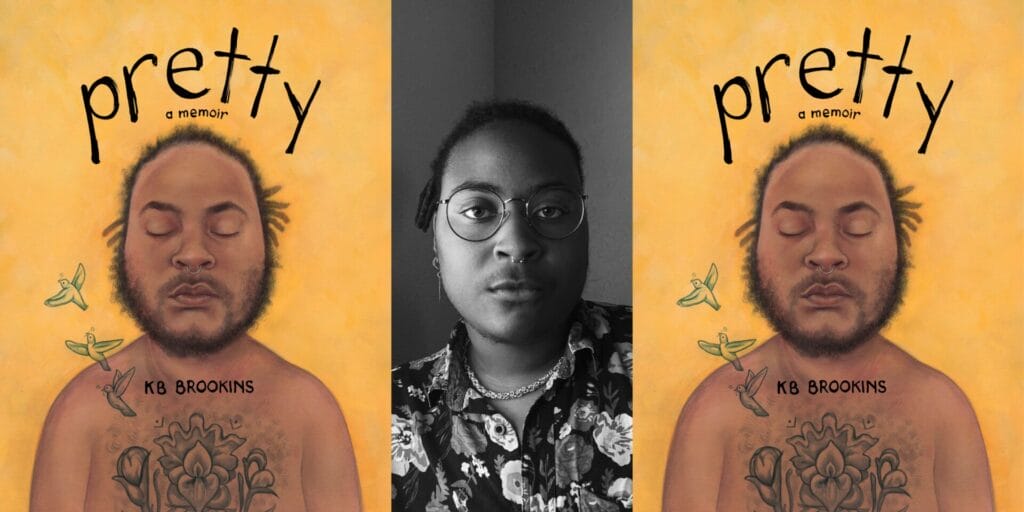Late last month, the world received yet another powerful reminder of the undeniable force and importance of Black queer stories in the form of KB Brookins’ debut memoir Pretty. A moving and vulnerable foray into what it means to navigate and embody desirability/desire, tenderness, softness, love, and masculinity as a queer and trans person, Brookins’ Pretty radiates honesty and authenticity.
Brookins, a Black, queer, and trans writer, cultural worker, and visual artist from Texas, writes with precision and clarity about the ways in which the social construction of gender, toxic masculinity, and erasure of queer and trans identities permeate the fiber of our lives and society, even from our earliest moments. At the outset of their book, they imaginatively outline the story of their birth, writing “‘It’s a girl,’ the nurse said, softly. My mother smiled big, then nodded in silence. That was the first sentence of a book that describes my undoing. That was the first story someone else told for me” (page 4). Through Pretty, Brookins re-seizes control of the narrative, taking back their own story and steering the course of their becoming.
Even as Brookins discusses the complexity of finding and accepting tenderness and softness from partners (and showing that tenderness and softness to others in turn) as they came to terms with their queer and trans identities, they also discuss the difficulty of giving themselves the same grace and care. Throughout the memoir, readers become intimately familiar with Brookins’ journey to self-love and acceptance, driven towards understanding through words that underline a shared humanity that everyone can relate to, regardless of your gender identity or sexual orientation: “I wasn’t born attached to gender. Just, like everyone, wanting to be loved” (p. 146).
In addition to the highly poignant meditations on love and the self, some of the most powerful moments of Brookins’ story come in the form of Brookins’ reflections on subjects rife with stress, trauma, and pain. Some of Brookins’ earliest reflections in Pretty reveal the difficulties Brookins faced living in Texas and growing up within the Church: “It was volatile, to be anything but small enough to fit in their holy boxes,” (p. 41) and “My only sin was being butch, full of questions, and alive” (p. 28). While these statements might initially seem to be symptomatic of a regional failing or misunderstanding of queer and trans people, across the memoir Brookins illuminates how it is a wider cultural failure of society to accept queer and trans people as they are.
Moving even deeper into some of the harsher aspects of their journey, the way in which Brookins addresses the impacts of toxic masculinity on their own life as well as the harm they caused through their internalization and enacting of toxic masculinity is particularly impactful. Rather than just laying out the ways they permitted or executed toxic masculinity, and the violence associated with it, in their own life, Brookins uses their missteps as an opportunity to urge other men and other people to do more to dismantle toxic masculinity as they see it show up around them and as it impacts the people they love.
Still, even while acknowledging the ache of pervasive queerphobia, transphobia, anti-Blackness, and toxic masculinity and violence, KB uses this pain to advocate for a better world: “We must believe people when they tell us who they are. We must create a culture where people’s reality always overpowers other people’s bigotry. There is no one on the planet who knows more about a person’s gender or sexuality than that person does, and the fact that political and everyday bullies team up on queer and trans people to tell them that their reality is invalid sickens me” (p. 102). Through various meditations, KB affirms their own journey, identity, and worth while imagining a future in which the external world and society does the same, saying “I’ve always been me: fat, Black, queer, trans, and pretty. I deserve a world where I don’t have to be resilient” (p. 63).
One of the ending lines of Brookins’ memoir acts as a kind of manifesto for reality: “One day, in my lifetime, or in a timeline that succeeds me, in some time that trans people inevitably will exist in, everyone will be treated as someone” (p. 139). It is a ramifying reminder of the strength of hope, and an indicator of the revolutionary power that exists in our stories, the possibilities that open up when Black, queer, trans stories like Brookins’ and memoirs like Pretty make their way into the hands of our community.
To keep up with KB Brookins and all things Pretty: A Memoir, you can visit their website, catch up with the Pretty book tour in a city near you, and follow KB on Instagram, Twitter, and TikTok.
About KB Brookins
KB BROOKINS is a Black, queer, and trans writer and cultural worker from Texas. They are the author of Freedom House and How to Identify Yourself with a Wound. Brookins has poems, essays, and installation art published in Academy of American Poets, Teen Vogue, Poetry Magazine, Prizer Arts & Letters, Okayplayer, Poetry Society of America, Autostraddle, and other venues. They have earned fellowships from the National Endowment for the Arts, PEN America, Equality Texas, and others.













